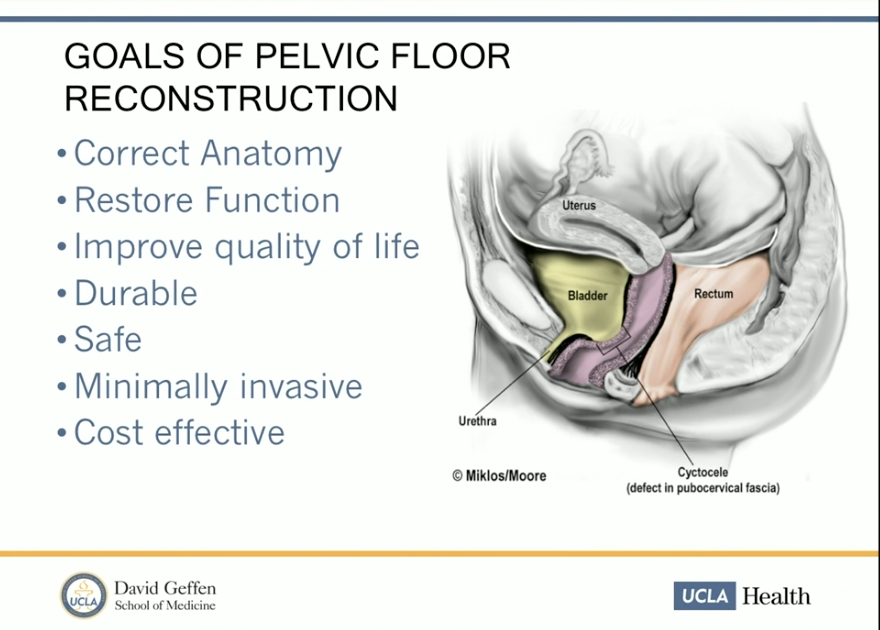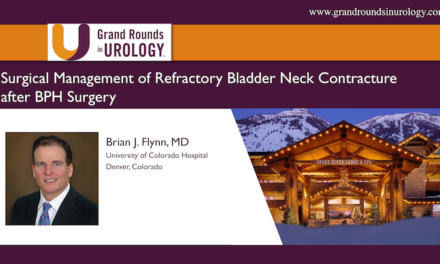Ja-Hong H. Kim, MD, presented “Novel Application of Autologous Fascia for Pelvic Floor Reconstruction in the Mesh Era” during the 23rd Annual Innovations in Urologic Practice on September 14, 2018 in Santa Fe, New Mexico.
How to cite: Kim, Ja-Hong H. “Novel Application of Autologous Fascia for Pelvic Floor Reconstruction in the Mesh Era” September 14, 2018. Accessed [date today]. https://dev.grandroundsinurology.com/management-of-recurrent-uti-in-era-of-antimicrobial-resistance/
Novel Application of Autologous Fascia for Pelvic Floor Reconstruction in the Mesh Era – Summary:
Ja-Hong Kim, MD, discusses the increased demand for pelvic floor reconstructive surgery, historical surgical methods, and complications associated with these methods. She then reviews two novel applications of fascia lata graft with video demonstrations of surgical techniques.
Abstract:
There is an increased demand for pelvic reconstruction surgery, as women are living longer and desire to maintain self-image and sexual health beyond menopause. While transvaginal mesh for prolapse may be a durable option for correcting anatomy and restoring function, its safety is unclear. Management of recurrent incontinence and prolapse following mesh related complications remain challenging to pelvic floor reconstructive surgeons.
Many of these patients present with physical and emotional pain, in addition to the original pelvic floor dysfunction. The management of these symptoms can further complicate patient care after mesh removal. To avoid the further complications of synthetic mesh, autologous graft is emerging in vaginal reconstructive surgery.
This lecture presents two novel applications of fascia lata graft. The first application is repair of severe recurrent cystocele that has failed multiple prior reconstructions. Additionally, this lecture reviews repair of recurrent apical prolapse with robot-assisted laparoscopic sacrocolpopexy (RSC) utilizing autologous fascia. This lecture illustrates surgical methods, tools, and technical considerations through video demonstrations. Following these demonstrations is a brief overview of short term outcomes regarding feasibility, safety, and efficacy.
About Innovations in Urologic Practice
Innovations in Urologic Practice (IUP) is an annual CME-accredited conference devoted to updating urologists on the rapidly changing healthcare environment. Topics focus on innovative diagnostic and treatment strategies, controversies, new and currently developing technologies, and challenges in today’s urologic practice. Dr. Kim presented this lecture during the 23rd IUP in 2018. Please visit this page in order to learn more about future IUP meetings.
ABOUT THE AUTHOR
Dr. Kim is an Associate Professor in the Division of Female Pelvic and Reconstructive Surgery in the Department of Urology at UCLA Health in Los Angeles, California. She received her undergraduate and medical degrees from the renowned BA/MD program at Rice University and Baylor College of Medicine, both in Houston, Texas. She completed a Residency in Urology at the Cleveland Clinic Foundation in Cleveland, Ohio, and received a Fellowship in Female Pelvic Medicine and Reconstructive Surgery at UCLA. Dr. Kim’s clinical interests include neurogenic and non-neurogenic voiding dysfunction, interstitial cystitis, benign prostatic hypertrophy, incontinence, neuromodulation for overactive bladder and urinary retention, vaginal prolapse, genitourinary reconstruction, and recurrent urinary tract infections. Dr. Kim has expertise in pelvic floor reconstruction and robotic and laparoscopic surgery. She aims to use these skills to improve patients’ quality of life and to help them regain physical function. Dr. Kim is involved with numerous professional organizations, including the American Urological Association, the Society of Women in Urology, the Society of Urodynamics and Female Urology, and the American Urogynecologic Society. She is also a reviewer for Neurology & Urodynamics, British Journal of Urology, Journal of Urology, and Urology.






